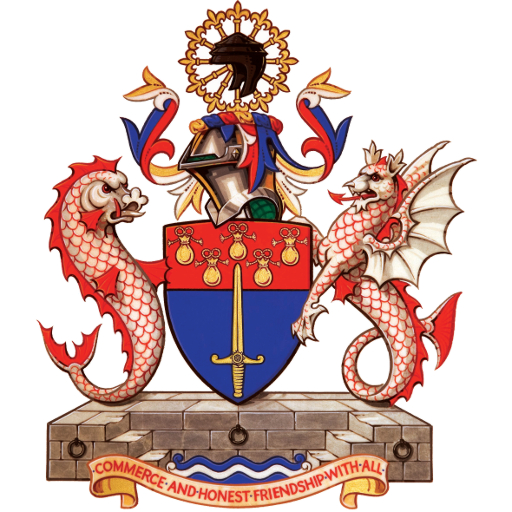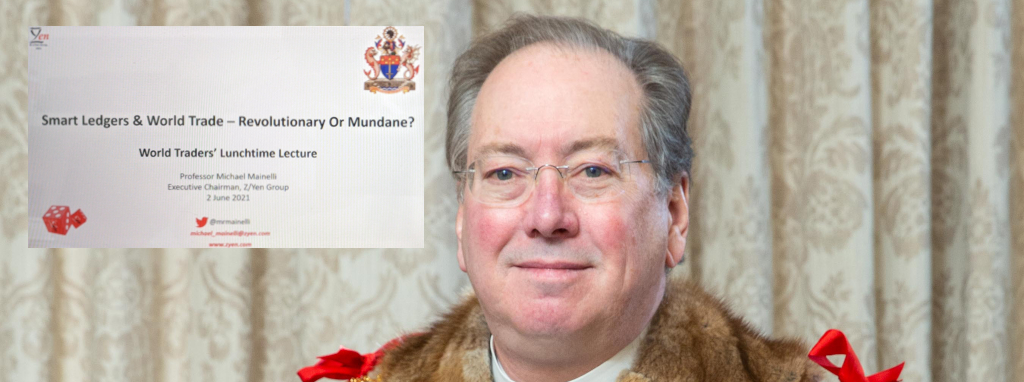Welcomed by the Master, Sue Algeo, Past Master Michael Mainelli, Alderman for Broad Street Ward in the City of London since 2013 and elected Aldermanic Sheriff on 24 June 2019, gave us an interesting talk around the background and uses of blockchain (or Big Data). He then followed with some very frank views on cryptocurrency including the practical and ethical issues that surround it as a method of payment and as a valid investment product.
The scene was set with an allegorical fable of a poor hungry man, who arrives in a village square and sets up a cooking pot over a fire, where he cooks a ‘Stone Soup’, a stone placed in the pot of water. As curious villagers arrive, they are persuaded that, although he is making an excellent soup, if they add some ingredients of their own, the soup will taste much better. Finally, a delicious soup is shared … after the stone is discarded. The point being that as more information is added to blockchain, the better the quality of conclusions that can be derived.
Blockchain can not only be used to collect and disseminate information but can also safeguard the integrity of historical information from tampering. Put simply, Blockchain is a modern-day ledger or database, where information that is assigned a distinct electronically signature can be deposited for future reference, secure in the knowledge that it cannot be tampered with.
What we define as blockchain was first created in the 1970s. A later iteration became a file sharing program called Napster, which illegally enabled the downloading and sharing of music files. Its downfall came because the file sharing servers were centrally located. This was followed by Gnutella, which has not been shut down only because the servers cannot be located.
More practical (and legal) has been the use in trade is to create specialised databases, where secure information concerning commercial transactions are stored. An example being land registers. To illustrate numerous applications, Michael highlighted several ‘apps’ that his company, Z/Yen, has developed. These included an app for Cornish fishermen to record their catches against quotas; an app that enables traders to record export orders enabling the banks to confidently assign export insurance; and Geostamping to locate where traded goods are on their journey. A new development is a blockchain application developed for Maersk, that can be shared with other container lines to track a container anywhere in the world.
Moving onto Cryptocurrencies, Michael was more circumspect. He highlighted the following points:
- Enough energy is used in ‘mining’ Bitcoin on a daily basis to power the Netherlands, which makes it very environmentally unfriendly.
- A limited numbers of cryptocurrency transactions are carried out each day – only 360 thousand, which is a very small fraction of, say, daily credit card transactions, meaning Bitcoin cannot be traded in the same way as currencies or stock and shares or other securities.
- The amount of funds that are tied up in cryptocurrency is also a very small percentage of investment compared to other financial products and for the time being will remain so. While investors may be increasingly attracted to cryptocurrency, on a practical level it can only be a small speculative position in a portfolio.
- While the core ledger of Bitcoin has never been broken into, the user interface is unwieldy, and many investors have accidentally lost Bitcoin or have let hackers into their accounts with the exchanges.
- Secrecy and the lack of involvement of banks may be an attraction, but in the end, coming back to blockchain, currencies are effectively ledgers, that monitor the flow of money, even if central banks do not track each banknote. Cryptocurrency is an effective way to illegally circumvent the surveillance of the flow of money and this leads to issues of tax evasion and illegal transactions.
As one might expect for two related complex and topical subjects, there were numerous questions, which Michael took in his stride. This was an a very enjoyable and informative lecture.
Slides may be downloaded here.

